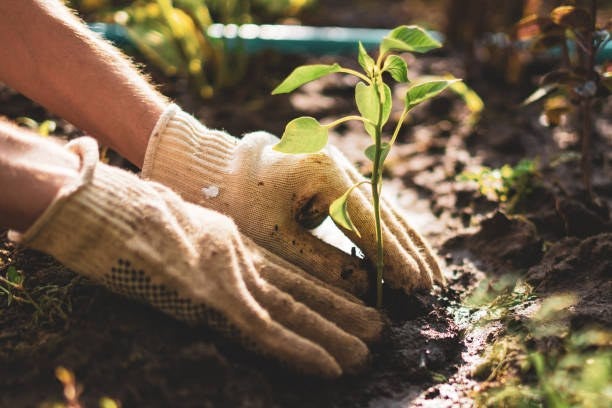In 2021, the continuance of the pandemic kept us outdoors in our yards and gardens. We’ve discovered that nature can help us through dark times, so we’ve hung bird feeders, planted gardens, and learned to love patio life. More than half of us are spending an extra two hours a day outside compared to pre-pandemic, according to a National Gardening Association survey, and we’re in no hurry to go back inside in 2022. Instead, we’re more motivated than ever to get creative with our yards, porches, and patios, giving some of the best gardening trends to get inspiration.There are so many options as to what we can do moving forward, to continue to stay outside. Taking our home office outdoors, restoring native plants to our landscapes, and making our front yards into welcoming places for connecting with friends and family. The team here at Corken + Company felt this list of gardening trends for 2022 will help you make the most of your outdoor spaces.
1. The Social Front Yard:
The isolation of the pandemic has left us craving a sense of community with others. Cue the return of the front porch, where we can sit outside and interact with the neighbors at a safe distance. Social media mentions of the front porch or yard hit a 5-year high in 2021.
Get your porch ready for socializing by adding comfortable seating, containers of plants, and an outdoor rug. Don’t have a porch? Go with a front yard patio. You’ll gain living space and have less grass to cut.
2. Lush, Colorful Gardens:
2022 is the year for color in gardening trends. Pantone’s 2022 Color of the Year is purple. (Very Peri is the official name, but it’s a vibrant, joyful purple.) Bring that trend to the garden by opting for colorful outdoor spaces. Plant 20-foot-tall, big-leafed tropical plants in colored containers, and choose plants with big, bold flowers. Make your outdoor spaces an oasis of energy, Grandmillenial style. After two pandemic years, we all could use a little exuberance.
3. Backyard Birding Keeps Soaring:
All the time we’ve spent at home since the pandemic began helped us discover the birds that frequent our yards. As hybrid work becomes the norm, expect sales of bird feeders and birdseed (which increased by 50% in 2021) to continue to be through the roof.
Plan on joining this year’s Global Big Day Bird Count, a 24-hour-long, worldwide event in May when you can submit live bird sightings on Cornell’s free eBird site. The event has had two years of record turnout, with birdwatchers spotting a record number of birds.
4. Planting for the Greater Good:
Expect more interest in gardens and landscapes that restore the natural world, instead of removing it. Last year, more than 67 million U.S. households bought at least one plant because it benefited pollinators or birds. That trend will continue to grow, as the 21 million newbie gardeners who picked up a trowel during the pandemic expand their garden skills.
To join in, check out the National Wildlife Federation’s Garden for Wildlife collection, which features native plant collections for 36 states. Another way to help nature out is to grow a preservation garden. With one in five of the world’s plants at risk of extinction, there are more than 4,400 endangered plants in the United States alone. Use the Rare Plant Finder Tool at the Center for Plant Conservation to find out which plants near you are at-risk, and plant some in your yard.
5. Cutting Gardens for Homemade Bouquets
Fresh flowers warm up a cold world, and that’s why flower sales increased by 10% in 2021. But with the prices of everything being up double digits due to inflation, fresh flowers are becoming less affordable. So more people are planting a cutting garden. Growing favorites like zinnias, dahlias, and black-eyed Susans is easier than you might think.
Plant some seeds in a sunny spot in the yard, add water, and you’ll have flowers for homemade bouquets all summer long. Unlike the flowers you buy from the grocery store or florist, yours will be locally grown, not shipped across-country by a truck spewing climate-altering emissions into the atmosphere. Your flowers will be carbon-neutral and free, and you can share them with your friends. What’s not to love?
6. Outdoor Home Offices:
Experts predict that 53% of the U.S. workforce will be working in a hybrid remote set-up in 2022. If you’re in that group, creating a workspace on your patio, yard, or deck will allow you to take your laptop outdoors. You’ll look better on Zoom in natural light, and sunshine can be a powerful mood booster.
Your outdoor workspace needs the same features as a home office: privacy, which you can create with dense plantings to muffle surrounding noise and block the neighbor’s view; shade, which you can create with a tree or pergola; a desk and chair, which can be a lounger and side table, or a patio chair and bistro table; and decor (think hanging planters and bold tropical plants in containers all around your “office”). You’ll never want to work under the glow of a fluorescent light again.
7. Edible Container Gardening:
A housing shortage and rising home prices have many of us renting longer than we used to. The median age of first-time homebuyers is now 34, so a lot of Millennials don’t have room for a garden. That doesn’t mean you have to delay your dreams of growing your own food. Plant a container garden on your deck and grow your own veggies while you save for a down payment.
Instead of paying $6 a pound for organic heirloom tomatoes, you can grow your own much more affordably. You’ll save money, eat locally, eat healthier, and shrink your carbon footprint. And, trend intersection alert: Put a container full of herbs such as rosemary, lavender, or lemon balm near your outdoor workspace, and get some calming aromatherapy while you work.
8. Quieter Lawn Equipment:
U.S. trends move from west to east, and this gardening trend is coming straight out of California, where the sale of new gas-powered lawnmowers, leaf blowers, and chain saws is banned beginning in 2024. Sure, gas-powered mowers and blowers remain legal in the other 49 states; but when the nearly 40 million people in California can no longer buy brain-rattling-loud, gas-powered tools to cut grass and blow leaves, the future of lawn tools changes.
The lawn-equipment industry has already been engineering more powerful electric mowers and leaf blowers. But now you can expect these efforts to reach next-level innovation in 2022 to meet the huge demand for zero-emissions tools looming on the West Coast. The age of quieter lawn equipment and cleaner air is on the horizon as we begin to mow and trim our landscapes with not-so-loud electric tools.
Find more 2022 gardening trends at:
https://www.bhg.com/gardening/gardening-trends/top-garden-trends-2022/





